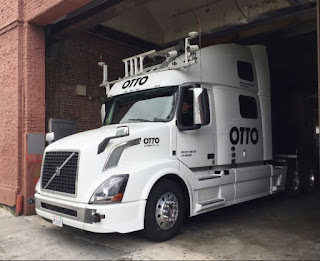Are Autonomous Trucks the End of the Road for Truckers?
By Diane Tait
 |
| Image courtesy wikimedia |
Autonomous vehicles are all the rage these days. You can’t turn on the TV or fire up an online
newsfeed without hearing or reading about an auto manufacturer that is putting
billions into developing self-driving car technology. Even Tesla is now spending big bucks to
develop automated big rigs. With this in
mind, the commercial trucking industry is in for a rethink on a massive scale
in the not too distant future. The
question is, how will this new technology affect the livelihoods of the 3.5
million professional truck drivers in this country.
1. Invasion of the Robo-Rigs? – Since 2017, the Internet
has been abuzz about the coming age of the robo-rigs. These 18-wheeled
behemoths are supposedly the vanguard of a myriad of other driverless
commercial vehicles that are predicted to invade the highways and byways of
this country within the next few years. The
bad news is that with Fortune 500 companies ready shelling out billions to
develop these automated monsters, the writing is on the wall that sooner or
later technology will prevail. The good
news is that their arrival isn’t necessarily the end of the road for commercial
drivers. This viewpoint is not without
precedent. Consider the airlines, for
instance. Today’s pilots don’t so much
fly their jumbo jets as provide system management while heading from Point A to
Point B. Today’s jetliners are fully
capable of taking off, landing, navigating and taxiing without the assistance
of either the pilot or the copilot. Yet
every airliner in the sky has at least two cockpit crew.
 |
| Image courtesy picpedia |
3. This
Litigious Nation – Just as there have already been a number
of accidents involving self-driving automobiles during the past couple of
years, how long do you think it will be before a driverless semi is involved in
an accident? As you know, once the smoke
clears and the wreckage and the bodies are hauled away, this is the cue for
attorneys to start unleashing a flurry of lawsuits. While major manufacturers are champing at the
bit to make driverless big rigs a reality, their ardor may dampen a bit when
their corporations get hit with monster lawsuits whenever a robo-rig gets in a
wreck.
4. Automation is
anything but foolproof – There is an acronym in the computer industry that says
a lot about the current state of the art in autonomous vehicles. GIGO, which is short for garbage in, garbage
out. What this translates to is an
automated vehicle of any kind is a slave to its programming. If the code that controls a driverless
vehicle has even one error or omission, the results can be catastrophic.
During the past two years Google’s
autonomous vehicles have been involved in nearly a dozen crashes. Last year an Uber autonomous taxicab was
involved in the first fatality by robo-car.
While some of the Google collisions were clearly the result of other
drivers, the Uber case showcased what could happen when an autonomous vehicle
has a technology hiccup. After the crash
occurred, the police in Arizona released footage of the crash as seen from the
Uber vehicle’s on-board camera. Here’s
what CNet had to say:
That video that was released
to the public shows footage of the pedestrian, Elaine Herzberg, walking her red
bike loaded with bags across a dark road. The video also shows the vehicle
operator, Rafaela Vasquez, sitting at the wheel constantly glancing down at her
lap. She looks up just as the car collides with Herzberg. While it's unclear
how a human driver would've reacted, some autonomous-vehicle experts who've
watched the video say the driverless car's broad array of sensors should have
detected Herzberg before she was hit. Tempe police say the car didn't slow down or swerve as
Herzberg appeared on the road. It hit her traveling at 38 mph.
 |
| Image courtesy flickr |
5.
Is
Automation Your Friend? – Automation run amok has always been a
touchstone for creating anxiety among the populace, particularly when the
automaton is on its own to make decisions which could affect people’s
lives. While we don’t have to yet worry
about Skynet unleashing legions of terminators, there will soon come a day when
autonomous vehicles will be a reality.
That being said, it shouldn’t be a reason for professional truckers to
lose sleep.
Already there are all kinds of automation
in cars and trucks in this country.
Everything from cruise control to lane maintain technology has been a
blessing to drivers of every stripe.
Today’s adaptive cruise control that automatically maintains a safe
distance and slows or even stops vehicles automatically has significantly
reduced accidents. My point is that worrying
about driverless big rigs taking away your job could wind up as much ado about
nothing. In fact, just the opposite
could well transpire where truckers will have at their disposal onboard automation
that makes it possible for them to drive further and safer while spending less
money on fuel, since automated vehicles can be programmed to drive more
efficiently than their human counterparts.
Just like airline pilots the world over, delivering cargo from coast to
coast via big rig could soon be less of a chore and just as lucrative of a job. As for the autonomous trucking industry, it
and their products are strictly a work in progress.
Diane Tait owns and operates A&B Insurance.
To find out more about how you can save money on boat insurance, go to her
site or fill out the form at right.


Terminators come in all shapes and sizes, don't they?
ReplyDeleteAutonomous vehicles are coming whether we like it or not. Just always look both ways before you t step out onto the street.
ReplyDelete